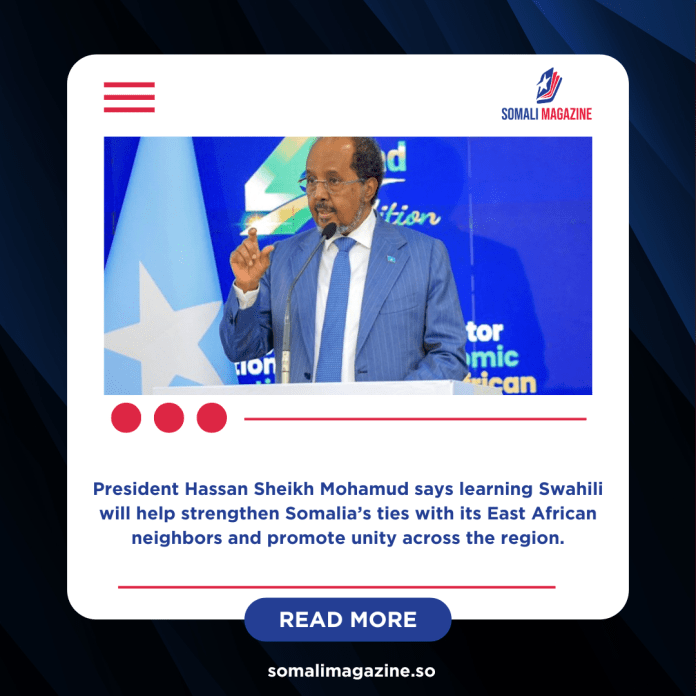Facebook Twitter (X) Instagram Somali Magazine - People's Magazine
Somali President Hassan Sheikh Mohamud has announced that his government will fast-track the introduction of Swahili into Somalia’s national education system. The move is part of efforts to strengthen the country’s integration within the East African Community (EAC), which Somalia officially joined in 2024 as its eighth member state.
Speaking during the 2nd East African Community Cooperation Conference (EACON2025) held in Mogadishu on Tuesday, President Mohamud said promoting Swahili in schools and universities will help Somalia align more closely with its East African neighbors and enhance regional cooperation. He emphasized that learning the common regional language would open more doors for Somali citizens in trade, education, and diplomacy across the region.
“The Somali National University, along with all Somali universities, must take the lead in promoting Swahili — the common language of the East African region,” he said, noting that language plays a major role in unity and mutual understanding among member states.
Swahili, also known as Kiswahili, is spoken by over 200 million people across East and Central Africa. It is already one of the official languages of both the African Union and the East African Community. The language serves as a bridge among diverse cultures in the region and is widely used in communication, education, and business in countries such as Kenya, Tanzania, and Uganda.
The Somali government now plans to make Swahili one of its key working and instructional languages, alongside Somali, Arabic, and English. By doing so, it hopes to ensure that young people in Somalia are better equipped to interact, trade, and collaborate with citizens of other EAC countries.
Education Minister Farah Sheikh Abdulkadir revealed that the Ministry of Education is already working with regional bodies to develop a comprehensive plan for introducing Swahili in schools and universities nationwide. “We are working to enhance the study and use of the Swahili language in Somalia,” he said. “We want to see Swahili become a language of communication, trade, and learning — even replacing English during our next conference.”
According to the minister, the National Higher Education Board has started collaborating with the East African Universities Association and the East African Qualifications Framework to design teaching materials, training programs, and standardized exams that will help integrate Swahili into Somalia’s education system.
For many Somalis, this step marks a new chapter in the country’s regional relations. Somalia’s entry into the East African Community has opened up opportunities for economic growth, cultural exchange, and shared development. By adopting Swahili, the government hopes to further break language barriers and make it easier for citizens to participate in regional affairs.
Language experts have long said that Swahili’s strength lies in its simplicity and inclusiveness, which have made it a language of unity across East Africa. With Somalia embracing it, the EAC’s goal of deeper regional integration takes another significant step forward.
As Somalia looks toward the future, education and language policy are becoming central to its regional identity. By promoting Swahili, the government is not just adding another subject to the curriculum — it is making a statement about belonging, cooperation, and shared destiny with the rest of East Africa.

